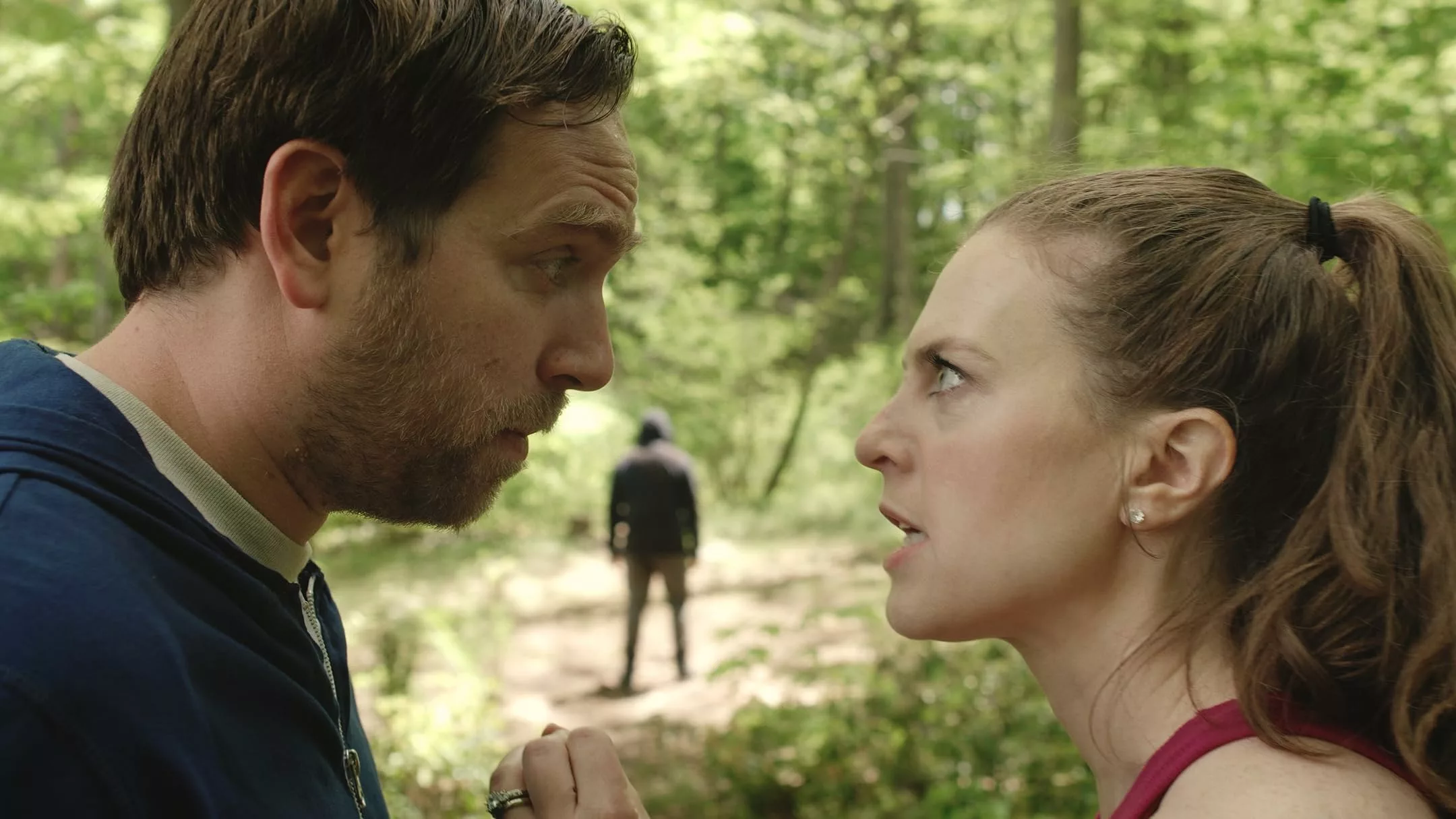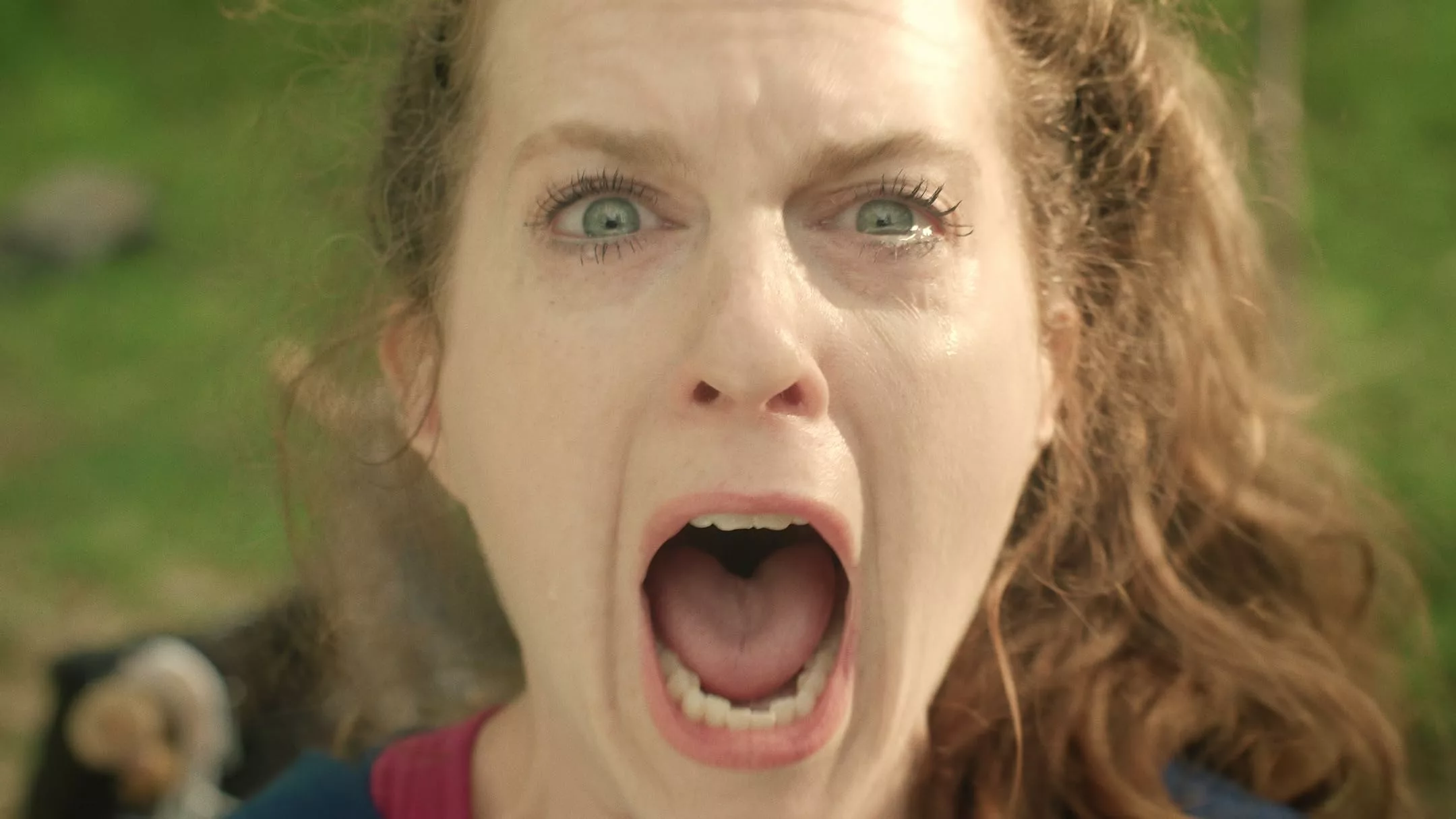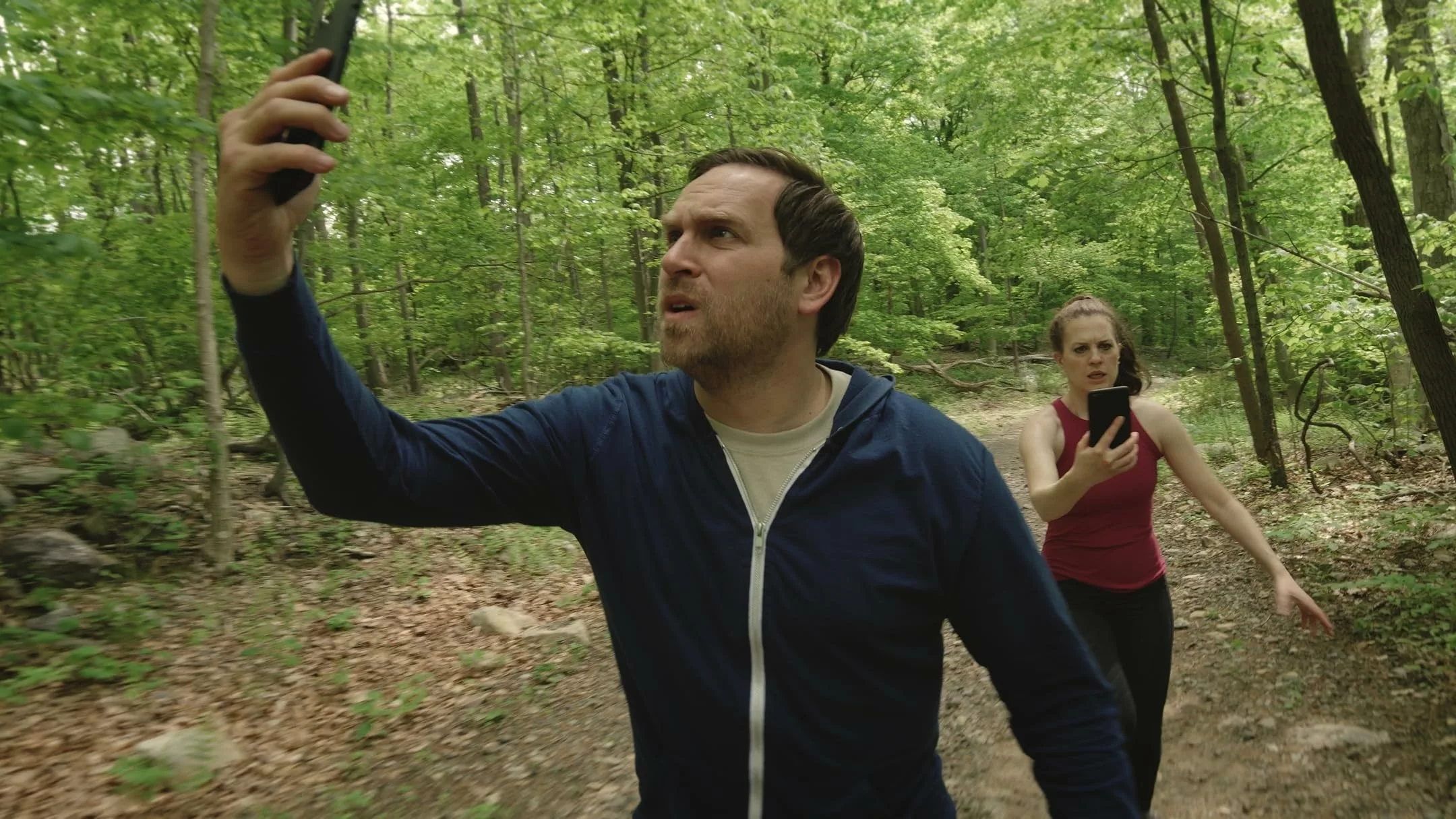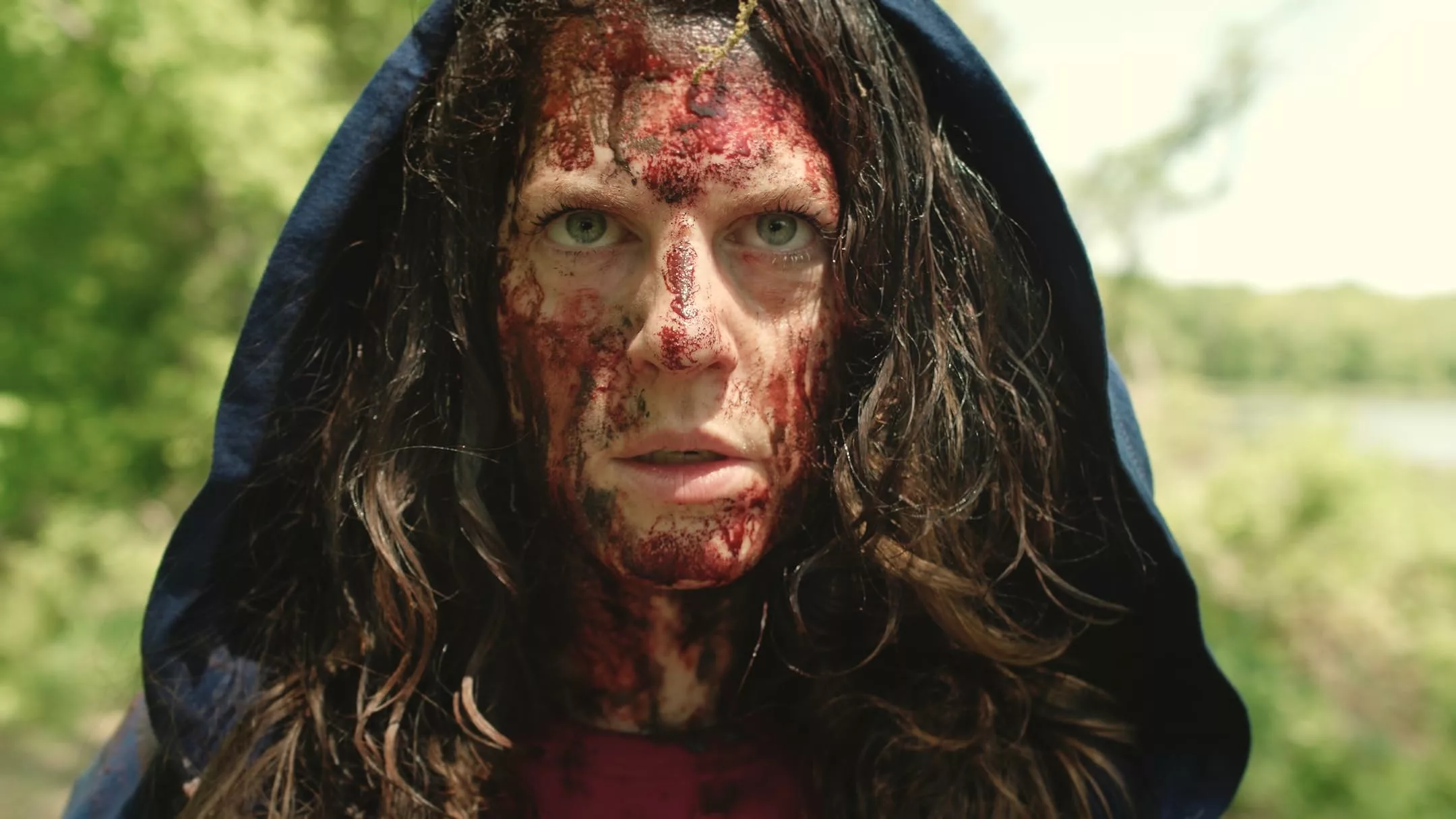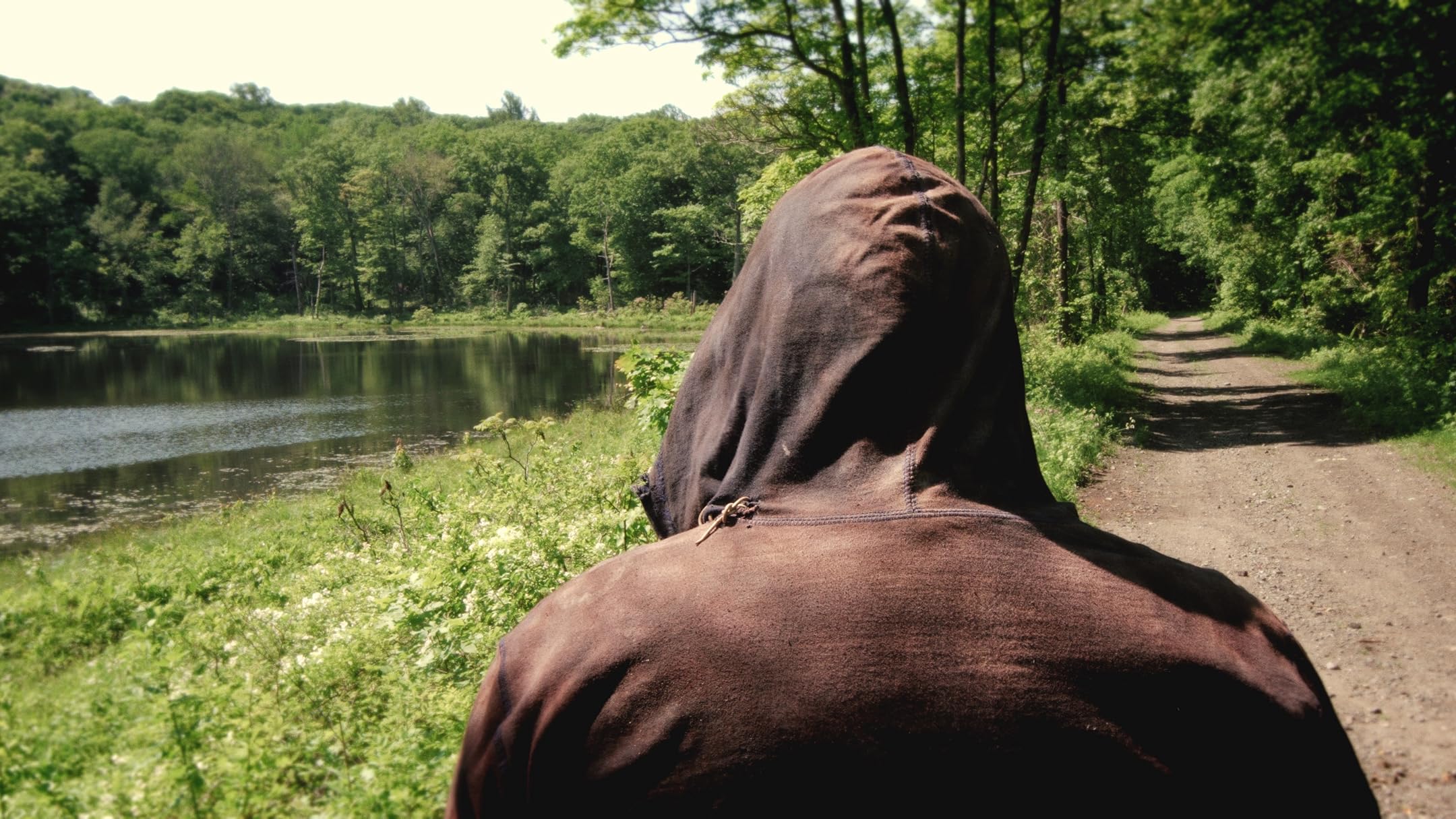Writer-director Dane Elcar takes the frustration of a failing marriage and traps it inside an endless, maddening cycle with his 2020 psychological thriller Brightwood. Stars Dana Berger and Max Woertendyke give raw, compelling performances as Jen and Dan, a couple gradually stripped down to their bare, twisted souls over multiple overlapping loops of the same fateful jogging path.
We join Jen and Dan deep in the routinized ritual of their morning run, though an air of resentment simmers under the surface. Jen listens to a divorce podcast on repeat while Dan’s attempts at conversation are rebuffed. As tensions reach a boiling point, they veer off the trail and discover—to rising unease—that they cannot escape the looping landscape. Elcar tightens the knot with each pass, peeling back layers of their psyche to reveal deeper wounds.
What begins as a metaphor for their dysfunctional dynamic becomes a full-fledged psychological horror. As realities fragment, a palpable sense of disconnection and dysreality emerges. Berger and Woertendyke evolve from estranged partners to unhinged ghosts of their former selves, eroded by the ceaseless erosion of time. Through its ingenious sci-fi premise, Brightwood offers an unflinching look at what happens when people stay in relationships that have turned truly rotten. It’s a chilling distortion of a common yet poignant fate, a waking nightmare viewers won’t easily shake.
Fates Intertwined
At the center of Brightwood are Jen and Dan, a couple coming undone yet bound ever tighter together. Played to raw perfection by Dana Berger and Max Woertendyke, they evolve from estranged partners to something darker as the looping path strips them to their cores.
When we first meet Jen and Dan, tensions simmer just below the surface. Jen seeks escape in her podcast, while Dan’s attempts at conversation are pointedly ignored. You get the sense that this dance is all too familiar. Still, flashes of affection survive, however bruised, keeping hope of reconciliation alive against all evidence.
As the loop traps them, frustration mounts. Subtle gripes erupt into savage accusations as past pains are re-opened. Berger is captivated as Jen’s anger and grief surge forth, the anguish of failing this relationship flowing free. Woertendyke matches her, conveying Dan’s bewilderment and fighting to comprehend how it came to this.
Repetition magnifies cracks in their dynamic, forcing poisonous routines to the fore. Patterns emerge that imprison as surely as the forest path. Yet in each other is stillness amid chaos, an anchor against unraveling minds. An odd solace forms, with two lost souls keeping each other sane.
By the harrowing end, they’ve peered into the abyss within one another. Where there was love now lingers only its ghost, yet also acceptance—they are bound as one, for better or far worse. In Berger and Woertendyke’s finale, a lifetime’s torment and twisted devotion collide in a mixture of horror and tragedy one won’t soon forget. Their searing performances ensure Brightwood will haunt viewers long after the closing credits.
Masterful Storytelling Within Limits
Brightwood’s resourcefulness is immediately apparent—just two characters, one setting, yet Dane Elcar spins a captivating tale. Constraints challenge any filmmaker, but he rises superbly to the test.
Elcar’s direction maintains drive despite minimal change. Repeating routes could bore, but he imbues each pass with nuance. Camera placements emphasize constriction without feeling recycled. Nature’s beauty contrasts Jen and Dan’s decay, the looping adding poetic meaning.
His cinematography secures us in the couple’s confinement. Close-ups amid dense woods increase unease, removing escape. Wider shots portray passengers on an unending ferry crossing turbulent waters, powerless as turmoil overwhelms. Elcar peers within their hell through observation, both intimate and vast.
Subtly, visuals supplement the story. Finding familiar items afresh sparks a realization of the loop’s control. Signs hinting at unknown presences deepen mystery. Elcar lets imagination fill in the in the blanks; his budget could not. Throughout, he retains expert control of this simple yet psychologically complex landscape, always keeping viewers looping with Jen and Dan down the spiraling path.
With great ingenuity, Elcar transforms outdoor confinement into a suffocating prison and theatrical stage. From sparse tools, he weaves compelling drama and whodunit that linger long after. Brightwood proves in skilled hands, constraints birth not limitations but limitless creative triumph.
The Endless Loop of a Failing Relationship
At first, Brightwood’s time loop presents a perplexing mystery—how will Jen and Dan escape the confines of the forest path? But audiences quickly realize that this literal loop mirrors the figurative loop the couple has long been trapped in.
Their arguments constantly circle back to the same problems in the same frustrating pattern. Now forced together on an endless jog, these issues boil over more violently as tempers flare. Bit by bit, layers peel back to reveal raw wounds left by years of toxicity.
Elcar masterfully depicts the deterioration of a relationship and the mounting psychological toll. Initially brushing off tensions, Jen and Dan regress to their worst behaviors when the comforts of separation vanish. Long-buried hurts resurface in blunt, unfiltered rage.
It’s cringe-worthy how disputes escalate from minor irritations to dire accusations. Desperate for the upper hand, each seeks whatever ammunition is possible to wound the other. The pettiness and desperation become excruciating to witness, yet impossible to look away from.
Their anguish taps into something universal. Haven’t we all known relationships where partners spin their wheels, going in circles while stubbornly refusing different routes? Haven’t we wanted to escape our own repetitive problems, regardless of the human cost?
Elcar crafts a chilling reflection on the hell of being eternally bound to someone yet longing to break free. Like the looping path, some bonds can feel equally inescapable, dragging two souls to their demise if left untangled.
With empathy and insight, Brightwood illuminates dysfunctional relationships’ insidious hold. It reminds us that while we can’t change others, controlling our responses remains an act of power—and that walking away need not mean derailing another’s humanity, only reclaiming our own.
Unsettling Ordeal in the Woods
Brightwood creeps up on you in a way that keeps viewers fully hooked. Elcar introduces an unnerving element early, as Jen finds weirdly multiplying earbuds in the woods. Their meaning remains murky, just like the “no swimming” sign’s purpose. These subtle clues hint at deepening mystery and foster an air of unease.
Tension steadily mounts as Jen and Dan search in vain for an exit. Every lap around the lake heightens their panic and our own. When strange masked figures first appear at the treeline, it sets pulses racing. Are these people here to help—or heighten the couple’s horror?
Brightwood holds nothing back in its chilling answers. Disturbing attack scenes show the physical and psychological toll is only beginning. Jen and Dan get battered far beyond their breaking point, viscerally conveying the hopelessness of the couple’s predicament. Even the bravest souls would shatter under such torment.
Elcar presents his scares in a grimly plausible light, magnifying the real-world terrors of failing relationships. Trapped in a seemingly inescapable routine, Jen and Dan deteriorate the way couples consumed by toxicity often do. Their worst fears surface as outside forces warp and amplify inherent tensions until humanity dissolves into savage survival.
The horror vibes deepen unease over how quickly civilization can crumble when we turn on loved ones. Elcar employs genre techniques to probe life’s deepest dysfunctions and our capacity for suffering at each other’s hands. Brightwood burrows under your skin by suffusing real psychological issues with supernatural dread.
Weaving Together Genres and Inspirations
Brightwood doesn’t just blend genres; it masterfully fuses multiple influences. Like Groundhog Day and Timecrimes, it uses the “time loop” trope to dissect a failing relationship. But where those films focus on lone protagonists, Brightwood gives us two distressed people caught in each other’s orbits.
Their dynamic undoubtedly draws from the intense and raw portrayals of crumbling love seen in Marriage Story and Strindberg’s plays. Jen and Dan skewer each other with a visceral, soul-flaying understanding built from years together. This anarchic interplay, heightened by their bizarre predicament, makes for utterly compelling viewing.
Yet Elcar spins these dramatic threads into unsettling horror. As the couple spins endlessly through the menacing woods, the tension turns their psychological entrapment into something literally frightening. Strange happenings gradually transform their private hell into a more cosmic nightmare.
Brightwood bears all the hallmarks of Elcar’s assured, budget-defying vision. Working with virtually no resources beyond his talented leads, he weaves a multi-layered tale that’s horrific, touching, and thought-provoking in equal measure. It feels utterly contemporary in fusing relationship drama with low-budget scare tactics, leaving us with a bleak allegory that’s unforgettably haunting.
Through mosaic-like allusions, Brightwood conjures a greater sum than its spare parts. Elcar forges fresh paths at the crossroads of cinema, proving once more that ingenious storytelling and strong characters can triumph where budgets fall short.
Boundless Promise Within Limited Means
With Brightwood, Dane Elcar has proven once more what a resourceful writer-director can achieve when armed with little more than a compelling concept. Taking a fraught marriage as his starting point, he weaves a tale that morphs subtly from character study to chilling nightmare.
Working with a mere two actors against the backdrop of a single setting, Elcar fills every frame with tension. Berger and Woertendyke offer raw, lived-in turns that anchor this surreal descent. Around them, Elcar seed hints of unease that flower into unforgettable moments of pure terror.
Yet what lingers longest is the view inside a relationship spiraling towards its demise. Elcar finds fresh layers of humanity in these flawed souls, even as brutal forces beyond their control bear down. It’s a staggering accomplishment with such meager resources.
Though spare, Brightwood feels abundantly rewatchable. Each revisit peels away further implications to uncover new wrinkles in its deceptively simple setup. Elcar’s skills promise great rewards if given the freedom to shine brighter. This intelligent indie may open doors to bolder horizons where his gift for fusing scares and empathetic realism can fully bloom. After such boundless invention within limitation’s bounds, the possibilities seem limitless indeed.
The Review
Brightwood
Dane Elcar has achieved something quite special with Brightwood. Within the constraints of a microscopic budget, he has crafted an unsettling futmic tale whose impact lingers long after the final frames. Marrying intense psychological drama with flourishes of visceral horror, Elcar forges a deeply disquieting allegory for the entrapments of a faltering marriage. It stands as a masterclass in novel storytelling that transcends any lack of blockbuster polish. Brightwood demands to be experienced with an open and inquisitive mind.
PROS
- A compelling central premise and metaphor
- Raw, emotionally authentic performances
- A palpable sense of tension and dread built on minimal elements
- A thought-provoking exploration of relationship dynamics
- Stylish direction that makes the most of limited production means
CONS
- Spare budgets sometimes show through minimal settings.
- Pacing drags slightly in the midsection.
- Open to interpretation, it may not satisfy those seeking answers.
- Concepts may divide audiences expecting a pure genre piece.









































